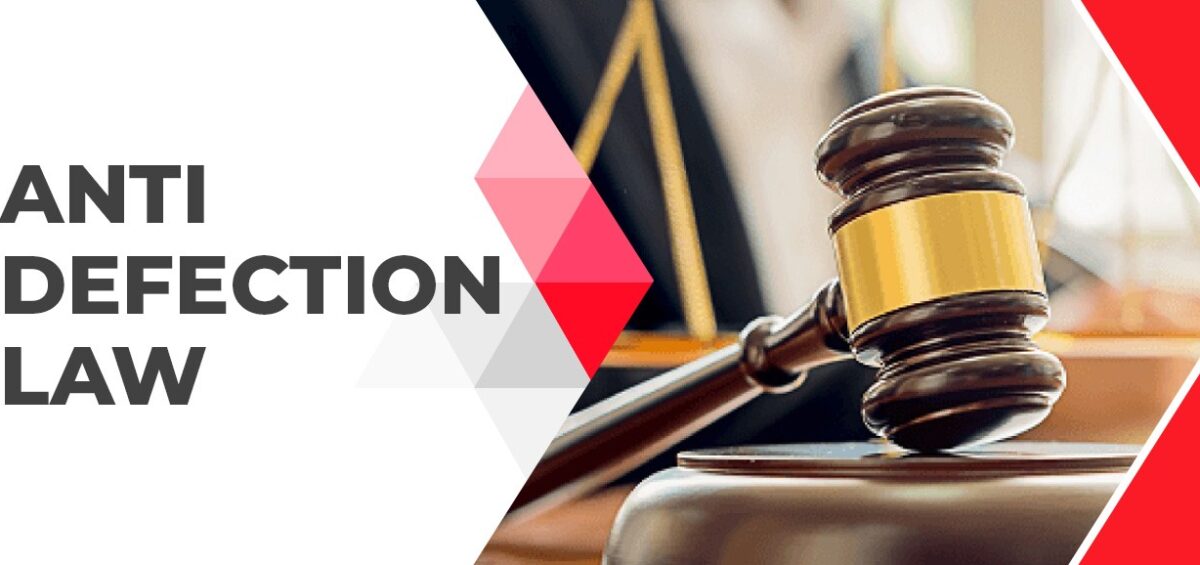What is The Anti Defection Law
The anti defection clause in the Indian Constitution‘s 10th Schedule is intended to deter political defections motivated by the temptation of office, pecuniary incentives, or other similar motives. Parliament established the anti-defection law in 1985, and it was reinforced in 2002. Its goal was to keep governments stable by deterring MPs from switching parties. After the federal elections of 1967, it was a reaction to the toppling of many state administrations by party-hopping MLAs.
What constitutes defection?
There are three types of scenarios covered by the statute.
- One occurs when legislators elected on a political party’s ticket “voluntarily” give up their membership or vote against the party’s wishes in the legislature. The words and actions of a politician both inside and outside the legislature can lead to a decision to voluntarily resign.
- The second scenario arises when an MP/MLA who has been elected as an independent joins a party later. After being nominated, they have six months to join a political party, according to the legislation. If they join a political party after that time, they stand to lose their seat.
- The third situation involves legislators who have been nominated. In their instance, the legislation stipulates that they can join a political party no later than six months after being appointed to the House.
Exception
- When two-thirds of a political party’s legislators vote to merge with another, neither the members who join the new party nor those who stay with the old party will be disqualified.
- Any person elected as chairman or speaker can resign from his party, and rejoin the party if he demits that post.
- Previously, the legislation permitted the splitting of parties, but this is now prohibited.
Who is the deciding authority?
The Presiding Officers of the Legislature (Speaker, Chairman) are the deciding authorities in such cases. The Supreme Court has held legislators can challenge their decisions before the higher judiciary.
Why there is a need for amendment?
- Despite the existence of a legislation, politicians continue to defect from one party to another.
- Anti-defection proceedings have been dragged out for years by speakers, chairpersons, and the courts.
- In anti-defection matters, the law is unclear about the timeline for action by the House Chairperson or Speaker.
Is the decision of the Presiding Officer subject to judicial review?
- Originally, the Act stated that the decision of the presiding officer was final and could not be challenged in a court of law. However, in the Kihoto Hollohan case (1992), the Supreme Court deemed this provision invalid on the grounds that it aims to limit the SC’s and high courts’ authority.
- The court decided that the presiding officer should act as a tribunal while deciding a question under the 10th Schedule. As a result, his/her decision (like that of any other tribunal) could be challenged in court for reasons such as malafides, perversity, and so on. The court, however, rejected the claim that the presiding officer’s adjudicatory powers are unlawful in and of themselves due to political bias.
- The Supreme Court dismissed Manipur minister Thounaojam Shyamkumar Singh from the state government in March 2020, restraining him “from entering the legislative assembly till further instructions” after disqualification petitions against him had been pending before the speaker since 2017.
- The Supreme Court ordered Parliament to amend the Constitution in January 2020, taking away the exclusive power of legislative assembly speakers to decide whether legislators should be disqualified or not under the anti-defection provision.
READ MORE: Daily Prelims Booster
READ MORE: Daily News Analysis




